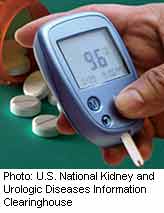- The Best Time of Day to Drink Bone Broth to Maximize Health Benefits
- 8 Ways to Increase Dopamine Naturally
- 7 Best Breads for Maintaining Stable Blood Sugar
- Gelatin vs. Collagen: Which is Best for Skin, Nails, and Joints?
- The Long-Term Effects of Daily Turmeric Supplements on Liver Health
- Could Your Grocery Store Meat Be Causing Recurring UTIs?
- Are You Making This Expensive Thermostat Error This Winter?
- Recognizing the Signs of Hypothyroidism
- 10 Strategies to Overcome Insomnia
- Could Artificial Sweeteners Be Aging the Brain Faster?
Tight Control of Type 2 Diabetes May Help Prevent Dementia


Keeping blood sugar levels in check may have a protective effect against dementia in people who have type 2 diabetes, new Swedish research suggests.
“The positive association between [average blood sugar levels] and risk of dementia in fairly young patients with type 2 diabetes indicates a potential for prevention of dementia with improved blood sugar control,” study author Dr. Aidin Rawshani, from the National Diabetes Register and Institute of Medicine in Gothenburg, Sweden, and colleagues wrote.
However, the study wasn’t able to definitively prove a cause-and-effect relationship between blood sugar levels and dementia; it was only able to show an association between these factors.
The study included almost 350,000 people with type 2 diabetes. They were all registered in the Swedish National Diabetes Registry between January 2004 and December 2012. They had no history of dementia when they were diagnosed with type 2 diabetes. The mean age was 67 years when the study began.
Study volunteers were tracked until the study ended in 2012 or they were hospitalized for dementia or died. Using a computer model, the researchers calculated the link between average blood sugar levels and dementia. Average blood sugar levels were based on the results of hemoglobin A1C tests (HbA1C). This test provides doctors with a several-month average of blood sugar levels, according to the American Diabetes Association (ADA). The ADA generally recommends an HbA1C level of 7 percent or less for people with diabetes.
Slightly more than 3 percent of those in the study — 11,035 people — were admitted to the hospital with dementia during the nearly five-year follow-up period.
After taking other variables into account, the study found that those with HbA1c levels of 10.5 percent or higher were 50 percent more likely to be diagnosed with dementia compared to people with HbA1c levels of 6.5 percent or less.
Study volunteers who’d had a previous stroke were 40 percent more likely to have declines in memory and thinking abilities, the researchers said.
The study’s findings were to be presented Sept. 14 at the annual meeting of the European Association for the Study of Diabetes, in Stockholm, Sweden. Findings presented at meetings are usually considered preliminary until published in a peer-reviewed medical journal.
More information
The American Diabetes Association has more on blood sugar management for people with type 2 diabetes.
Source: HealthDay
Copyright © 2026 HealthDay. All rights reserved.










